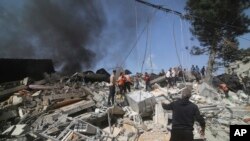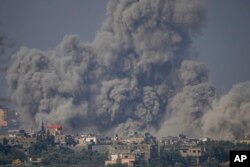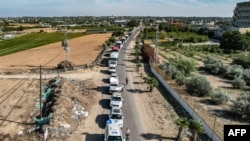The Israeli military carried out airstrikes Monday in the Gaza Strip, while European Union foreign ministers met to consider calling for a humanitarian cease-fire.
Israeli aircraft also struck multiple Hezbollah targets in Lebanon, including cells the military said were preparing to launch anti-tank missiles and rockets toward Israel.
EU foreign policy chief Josep Borrell told reporters he believes a humanitarian pause in the conflict is needed to allow support to reach people in Gaza.
His comments came a day after a second aid convoy was allowed through the Rafah border crossing into Gaza.
“The first day, 20 trucks were allowed to come in, 20,” Borrell said. “Yesterday, were about 20 more. But in normal times, in normal times without war, 100 trucks enter into Gaza every day. So it's clear that 20 is not enough."
Israel has conducted more than two weeks of strikes on Gaza in response to the October 7 attack by Hamas militants that killed 1,400 people.
The death toll in Gaza Monday had reached at least 5,087 people, with another 15,273 people injured, according to the Palestinian Health Ministry.
The United Nations says about 1.4 million people have fled their homes and that there are critical shortages of water, food, fuel and medicine in Gaza.
Borrell also said efforts toward de-escalation have to include a halt to Hamas rocket attacks from Gaza and the release of hostages the militant group is holding.
Israeli officials have vowed to continue the airstrikes until Hamas has no more ability to attack.
The leaders of the United States, Canada, France, Germany, Italy and Britain on Sunday discussed the Israel-Hamas war during a telephone call convened by U.S. President Joe Biden.
In a joint statement, they underscored their support for Israel and its right to defend itself, but also urged it to adhere to international humanitarian law and protect civilians. They welcomed the release of two hostages and called for the immediate release of all remaining hostages.
U.S. Defense Secretary Lloyd Austin and Secretary of State Antony Blinken both said in interviews Sunday the United States is concerned about the Israel-Hamas war expanding in the Middle East.
Austin told ABC’s “This Week” show, “We’re concerned about potential escalation…a significant escalation.” But he said the U.S. has “the ability to respond,” noting that a U.S. Navy warship shot down drones launched from Yemen that might have been headed toward Israel.
“We maintain the right to defend ourselves and we won’t hesitate to respond,” Austin said.
Blinken told NBC’s “Meet the Press” show, “We expect that there's a likelihood of escalation. Escalation by Iranian proxies directed against our forces, directed against our personnel.”
“We are taking steps to make sure that we can effectively defend our people and respond decisively if we need to,” the top U.S. diplomat said. “This is not what we want, not what we're looking for. We don't want escalation. We don't want to see a second or third front develop. We don't want to see our forces, or our personnel come under fire. But if that happens, we're ready for it.”
Blinken said the U.S., while warning Hezbollah against expansion of fighting against Israel from Lebanon, has “deployed very significant [military] assets to the region, two aircraft carrier battle groups, not to provoke, but to deter, to make clear that if anyone tries to do anything, we're there.”
United Nations correspondent Margaret Besheer contributed to this article. Some information for this report came from The Associated Press, Agence France-Presse and Reuters.










